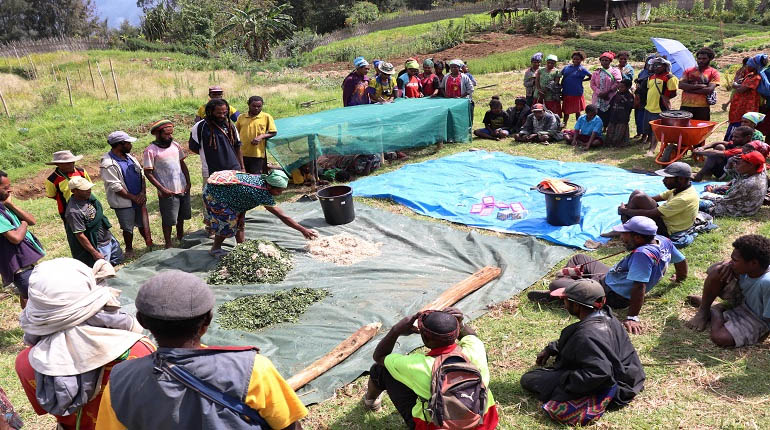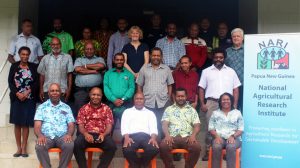Just like other aspects of life, agricultural activities mirror the culture and mindset of the society in which they are practiced. This could not be more real than in a Melanesian country like Papua New Guinea. Here, bias gender roles have been attributed and carried like a ‘yoke of burden’ in our rural communities, for so many decades and generations.
While cultural norms do serve a purpose in a given place and time, they can also get in the way of new ideas and thereby undermine opportunities for people to perform to their potential in all aspects of life. It is a pity to see that biases associated with our customs and traditions still influence the roles and privileges bestowed upon men and women in the smallholder farming sector.
Nowadays, this situation is particularly challenging due to the expansion of semi-commercial farming into areas that predominantly practice subsistence agriculture. In our work, the National Agricultural Research Institute (NARI) has tried out different farming models to help smallholder farmers adopt and apply inclusive processes to enhance their productive potentials.
Many models have been tried in recent years. These models incorporate principles of gender equality to give all members of families or community groups equal opportunities to participate in managing and benefiting from their farms. Traditionally, men contributed relatively little time and labour but wielded overall control over how farms are run and benefited from.
Hence, new models have been initiated to offer innovative options on how traditional family and community group farms could be organised. One of the models that have been tried is the Family Farm Team (FFT). This model is centred on the concept of gender inclusivity. It seeks to show that men and women can achieve better farming results by having fair opportunities to contribute resources, perform responsibilities and share the benefits of their work.
FFT was rolled out in six provinces between 2012 and 2018. Over this period, selected families were assisted to adopt inclusive practices in the running of their farms. Many a husband was compelled to appreciate and value the contribution of their wives’, children and extended families towards their farm projects. This inspired everyone to be more committed and confident in performing their assigned roles.
The FFT model gives everyone an opportunity to realise their true potentials through a set of core strategies. These strategies are captured in modules which promote families working together as teams; planning their farm projects; generating and sharing livelihood benefits; and observing inclusive processes of dialogue and decision-making.
Successful family or community group farms need open channels of communication so that ideas could be generated and discussed in a manner that is collective and transparent. Decisions reached in this manner tend to draw people together around shared goals and purposes. Experience from the trials showed that decisions reached by consensus were executed with a greater sense of ownership, diligence and success.
Families learnt that every member of their groups has a right to fair representation in decision-making processes. It is important that farming communities should nurture this right so that it would become a norm that is widely accepted and practiced. This would help smallholder farms to harness and utilise the talents of marginalised individuals and groups – regardless of age, gender or ability – to achieve higher levels of productivity.
Many families who participated in the trials expressed that collective decision-making had helped them to plan their farm projects by capturing the needs and potentials of everyone. Members were assigned responsibilities and challenged to meet set targets through calculated applications of their time, labour and resources.
Working to plans gave families the opportunity to appreciate the virtue of being accountable. This is important as our society needs to instil sound moral values in our citizens. It is therefore ideal to involve children so they can learn to produce results to ascertain how they have delivered on key targets and responsibilities. This would help them to develop at a very early age the virtue of being honest and transparent.
Apart from the family farm team model, we have also ventured into developing gender training manuals for different projects. One has already been done for the recently completed solar rice mill project. Work is currently underway to compile a similar document for our climate change projects. These initiatives are aligned to NARI’s Gender Equity and Social Inclusion Policy and ongoing efforts to mainstream gender within its programmes and projects.
The institute is keen to enhance the potential of all people involved in smallholder farming to become productive members of their communities. Hence, we will continue to work with key partners and stakeholders to develop and implement gender-friendly programmes to make this a reality.




